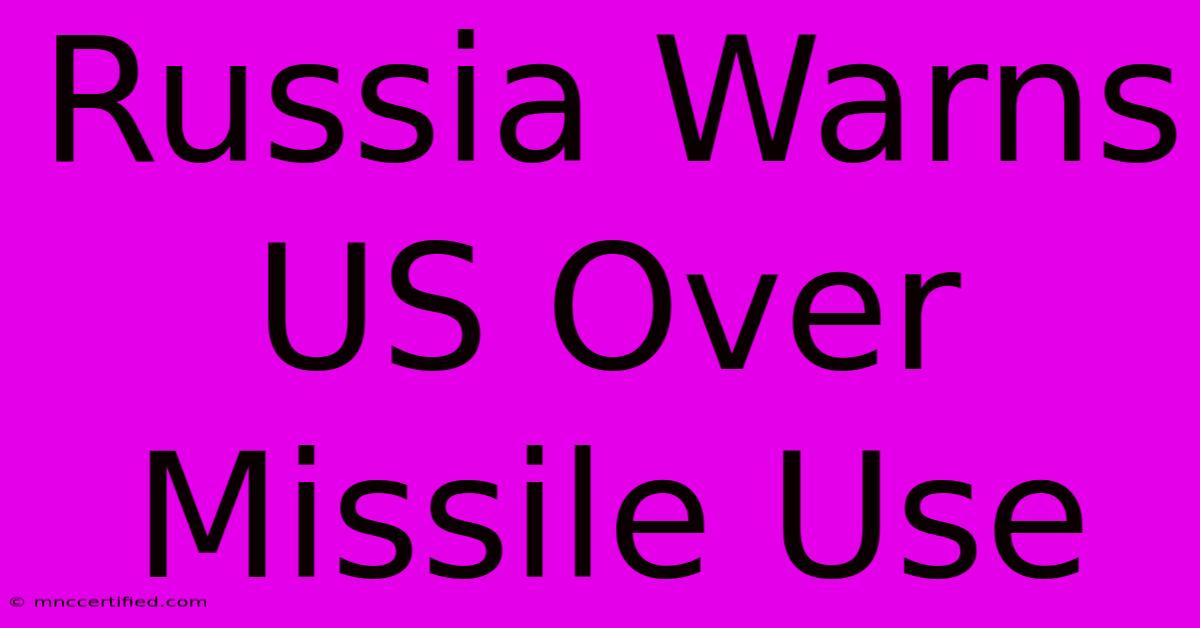Russia Warns US Over Missile Use

Table of Contents
Russia Warns US Over Potential Missile Use in Ukraine Conflict
Russia has issued a stark warning to the United States regarding the potential use of long-range missiles in the ongoing conflict in Ukraine. This escalating tension underscores the delicate balance of power and the heightened risk of direct confrontation between the two nuclear superpowers. The warning, delivered through various diplomatic channels, highlights Russia's deep concerns about the trajectory of the war and the potential for further escalation.
The Nature of the Russian Warning
The specifics of the Russian warning remain somewhat opaque, intentionally veiled in diplomatic language. However, the core message is clear: the provision of long-range missiles to Ukraine, particularly those capable of striking deep into Russian territory, would be viewed as a significant escalation with potentially devastating consequences. This isn't simply a verbal threat; it's a calculated attempt to deter the US from supplying such weaponry. Russia frames the potential use of these missiles as a direct threat to its national security, justifying a potential, albeit unspecified, response.
Key Concerns Highlighted by Russia:
- Escalation of the Conflict: The introduction of long-range missiles could dramatically alter the battlefield dynamics, potentially leading to a wider, more destructive war.
- Direct Threat to Russian Territory: The ability to strike deep within Russia's borders represents a significant shift in the conflict's geographical scope, crossing a previously established red line.
- Unpredictable Consequences: Russia warns of unpredictable and potentially catastrophic consequences stemming from such actions, hinting at a possible retaliatory response.
US Response and the International Community's Role
The United States has responded to Russia's warning with a mixture of firmness and measured restraint. While the US hasn't explicitly ruled out providing long-range missiles to Ukraine, it has emphasized its commitment to providing Ukraine with the necessary tools for self-defense. The US continues to carefully weigh the risks and benefits of supplying such weaponry, acutely aware of the potential for escalation.
The international community is closely monitoring this situation, with many nations expressing serious concerns about the potential for further escalation and a wider conflict. Diplomatic efforts to de-escalate the situation are ongoing, although the prospects for immediate success remain uncertain. The situation demands careful navigation, requiring a delicate balance between supporting Ukraine and preventing a larger, more devastating war.
Analyzing the Geopolitical Implications
The ongoing conflict in Ukraine is already fraught with geopolitical complexities, and the potential introduction of long-range missiles adds a new layer of instability. This situation highlights:
- The Shifting Balance of Power: The provision of advanced weaponry to Ukraine directly challenges Russia's regional dominance.
- The Risk of Miscalculation: The possibility of miscalculation or accidental escalation remains high, especially in the context of a highly volatile conflict.
- The Role of NATO: NATO's response to this escalating tension will be crucial in shaping the future course of the conflict. Any direct involvement by NATO could dramatically raise the stakes.
Conclusion: A Precarious Situation
The Russian warning regarding the potential use of long-range missiles in Ukraine represents a significant moment in the ongoing conflict. The situation is highly precarious, demanding careful consideration from all parties involved. The potential for escalation is real, and the international community must work diligently to prevent a wider, more destructive conflict. The coming weeks and months will be crucial in determining the trajectory of this dangerous standoff. The outcome will significantly shape the geopolitical landscape for years to come.
Keywords: Russia, US, Ukraine, Missile, Warning, Conflict, Escalation, Geopolitics, NATO, Long-range missiles, National Security, International Relations, Diplomacy, Self-defense, Retaliation.

Thank you for visiting our website wich cover about Russia Warns US Over Missile Use. We hope the information provided has been useful to you. Feel free to contact us if you have any questions or need further assistance. See you next time and dont miss to bookmark.
Featured Posts
-
Sports Embrace Trump Dance
Nov 19, 2024
-
Goty 2024 Nominations Full List
Nov 19, 2024
-
Sidemen Fill Wembley For Charity Football
Nov 19, 2024
-
Conways Scotland Debut First Start
Nov 19, 2024
-
Uk Expected To Supply Ukraine With Storm Shadow Missiles
Nov 19, 2024